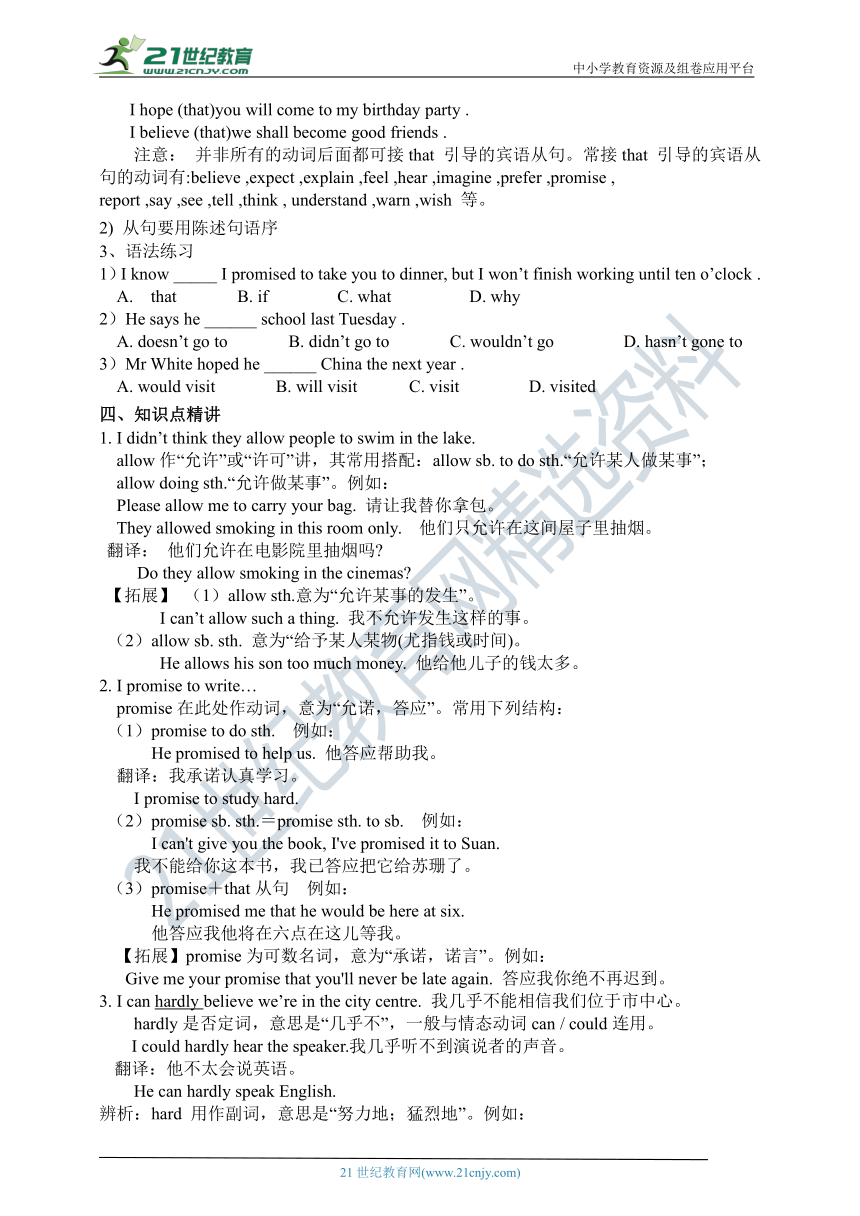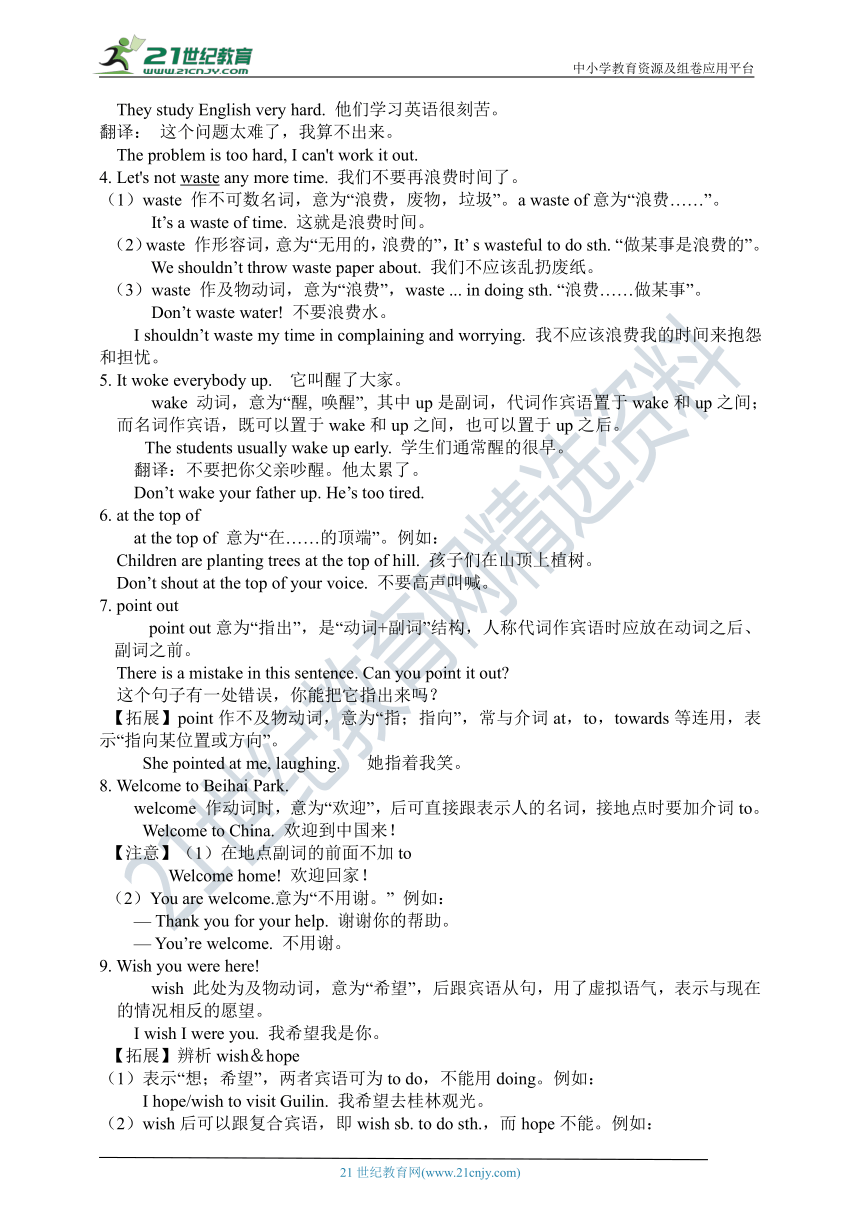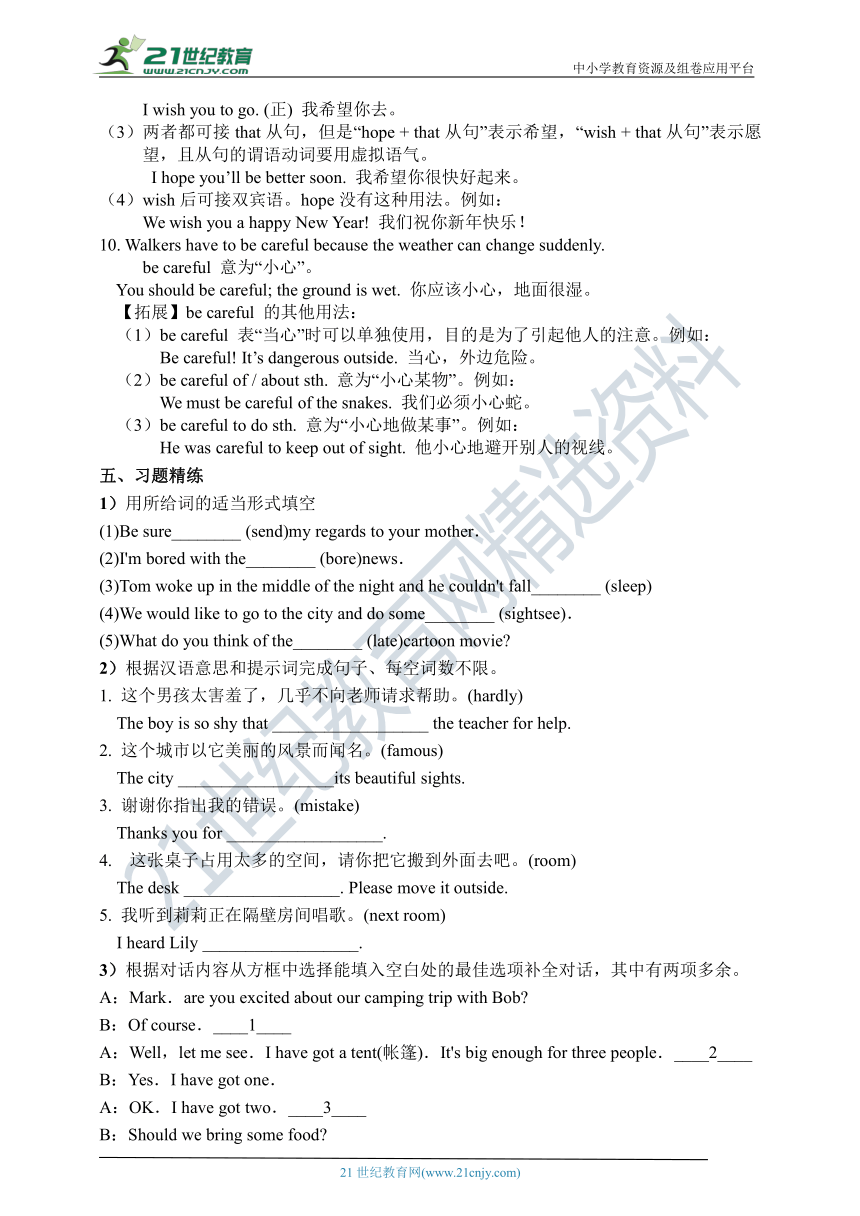Module 8 Time off 模块同步学案(要点精析+习题精炼)
文档属性
| 名称 | Module 8 Time off 模块同步学案(要点精析+习题精炼) |

|
|
| 格式 | zip | ||
| 文件大小 | 1.2MB | ||
| 资源类型 | 试卷 | ||
| 版本资源 | 外研版 | ||
| 科目 | 英语 | ||
| 更新时间 | 2020-03-29 00:00:00 | ||
图片预览




文档简介
中小学教育资源及组卷应用平台
外研版八下Module 8 Time off要点精析+习题精炼
一、短语精背(词块记忆)
1. ?hear?of?/?about??听说 2.?hear?the?birds?singing 听见鸟在鸣叫
3. ?be?famous?for…因…而著名? 4.?point?out指出;指明?
5. ?walk?along?the?lake沿湖散步? 6.?climb?up?the?hill爬上山?
7. allow?sb.?to?do?sth.允许某人做某事? 8.?have?a?picnic野餐?
9. at?the?top?of?the?hill 在山顶? 10. ?time?off??休假??
11. so…that如此…以致于?? 12.?place?of?interest?名胜?
13.??promise?to?do?sth. 允诺做…? 14.?have?a?wonderful?time 玩得很高兴
15.?strange?shape?of?the?rocks 奇形怪状的巨石 16.?wake?sb.?up把…吵醒
17.?It’s?a?pity?that… 很遗憾。。。?? 18.??get?lost?迷路?
19.?fall?asleep?入睡? 20.?learn?how?to?do…学会如何做.?.?.??
21.?on?Thursday?evening? 在周四晚上?? 22.?on?a?clear?day ?在一个明朗的日子?
23.?be?popular?with?sb. 受到某人的欢迎??
二、句型精背
1.?It’s so?quiet that?I can even hear the birds singing! 如此安静,以至于我甚至能听到鸟儿在唱歌。
2.?I can hardly?believe we're in the city centre. 我难以置信我们身处城市中心。
3.?This park is famous for?its lake. 这个公园因它的湖泊而著名。
4.?I promised to?write?to?you.?我保证会给你写信。
5.?Last night we camped by a small lake. 昨晚,我们在小湖边宿营。
6.?The noise?woke?everybody up. 噪音吵醒了每一个人。
7.?We came out?without?making any noise.?我们出来了,没有制造任何噪音。
8.?Dongting Lake?is the second largest?freshwater lake in China. 洞庭湖是中国第二大淡水湖。
三、语法精讲: That引导的宾语从句
1、教材典句
I can hardly believe we’re in the city centre .
I don’t think they allow people to swim in the lake .
But Lingling ‘s uncle said that it was wrong to pull leaves off plants and that we should protect everything here .
语法全解
放在动词后面作宾语的句子称为“宾语从句”
宾语从句可以分为三类:一类是that引导的宾语从句; 一类是whether /if 引导的宾语从句 。
宾语从句的引导词that
当谓语动词表示肯定的概念,如“希望”:“相信”:“知道”或“说”时,其后面的句子一般用that 引导。That没有任何意义, 只具有语法功能。
I hope (that)you will come to my birthday party .
I believe (that)we shall become good friends .
注意: 并非所有的动词后面都可接that 引导的宾语从句。常接that 引导的宾语从句的动词有:believe ,expect ,explain ,feel ,hear ,imagine ,prefer ,promise ,
report ,say ,see ,tell ,think , understand ,warn ,wish 等。
从句要用陈述句语序
3、语法练习
1)I know _____ I promised to take you to dinner, but I won’t finish working until ten o’clock .
A. that B. if C. what D. why
2)He says he ______ school last Tuesday .
A. doesn’t go to B. didn’t go to C. wouldn’t go D. hasn’t gone to
3)Mr White hoped he ______ China the next year .
A. would visit B. will visit C. visit D. visited
四、知识点精讲
1. I didn’t think they allow people to swim in the lake.
allow作“允许”或“许可”讲,其常用搭配:allow sb. to do sth.“允许某人做某事”;
allow doing sth.“允许做某事”。例如:
Please allow me to carry your bag. 请让我替你拿包。
They allowed smoking in this room only. 他们只允许在这间屋子里抽烟。
翻译: 他们允许在电影院里抽烟吗?
Do they allow smoking in the cinemas?
【拓展】 (1)allow sth.意为“允许某事的发生”。
I can’t allow such a thing. 我不允许发生这样的事。
(2)allow sb. sth. 意为“给予某人某物(尤指钱或时间)。
He allows his son too much money. 他给他儿子的钱太多。
2. I promise to write…
promise在此处作动词,意为“允诺,答应”。常用下列结构:
(1)promise to do sth. 例如:
He promised to help us. 他答应帮助我。
翻译:我承诺认真学习。
I promise to study hard.
(2)promise sb. sth.=promise sth. to sb. 例如:
I can't give you the book, I've promised it to Suan.
我不能给你这本书,我已答应把它给苏珊了。
(3)promise+that从句 例如:
He promised me that he would be here at six.
他答应我他将在六点在这儿等我。
【拓展】promise为可数名词,意为“承诺,诺言”。例如:
Give me your promise that you'll never be late again. 答应我你绝不再迟到。
3. I can hardly believe we’re in the city centre. 我几乎不能相信我们位于市中心。
hardly是否定词,意思是“几乎不”,一般与情态动词can / could连用。
I could hardly hear the speaker.我几乎听不到演说者的声音。
翻译:他不太会说英语。
He can hardly speak English.
辨析:hard 用作副词,意思是“努力地;猛烈地”。例如:
They study English very hard. 他们学习英语很刻苦。
翻译: 这个问题太难了,我算不出来。
The problem is too hard, I can't work it out.
4. Let's not waste any more time. 我们不要再浪费时间了。
(1)waste 作不可数名词,意为“浪费,废物,垃圾”。a waste of意为“浪费……”。
It’s a waste of time. 这就是浪费时间。
(2)waste 作形容词,意为“无用的,浪费的”,It’ s wasteful to do sth. “做某事是浪费的”。
We shouldn’t throw waste paper about. 我们不应该乱扔废纸。
(3)waste 作及物动词,意为“浪费”,waste ... in doing sth. “浪费……做某事”。
Don’t waste water! 不要浪费水。
I shouldn’t waste my time in complaining and worrying. 我不应该浪费我的时间来抱怨和担忧。
5. It woke everybody up. 它叫醒了大家。
wake 动词,意为“醒, 唤醒”, 其中up是副词,代词作宾语置于wake和up之间;而名词作宾语,既可以置于wake和up之间,也可以置于up之后。
The students usually wake up early. 学生们通常醒的很早。
翻译:不要把你父亲吵醒。他太累了。
Don’t wake your father up. He’s too tired.
6. at the top of
at the top of 意为“在……的顶端”。例如:
Children are planting trees at the top of hill. 孩子们在山顶上植树。
Don’t shout at the top of your voice. 不要高声叫喊。
7. point out
point out意为“指出”,是“动词+副词”结构,人称代词作宾语时应放在动词之后、副词之前。
There is a mistake in this sentence. Can you point it out?
这个句子有一处错误,你能把它指出来吗?
【拓展】point作不及物动词,意为“指;指向”,常与介词at,to,towards等连用,表示“指向某位置或方向”。
She pointed at me, laughing. 她指着我笑。
8. Welcome to Beihai Park.
welcome 作动词时,意为“欢迎”,后可直接跟表示人的名词,接地点时要加介词to。
Welcome to China. 欢迎到中国来!
【注意】(1)在地点副词的前面不加to
Welcome home! 欢迎回家!
(2)You are welcome.意为“不用谢。” 例如:
— Thank you for your help. 谢谢你的帮助。
— You’re welcome. 不用谢。
9. Wish you were here!
wish 此处为及物动词,意为“希望”,后跟宾语从句,用了虚拟语气,表示与现在的情况相反的愿望。
I wish I were you. 我希望我是你。
【拓展】辨析wish&hope
(1)表示“想;希望”,两者宾语可为to do,不能用doing。例如:
I hope/wish to visit Guilin. 我希望去桂林观光。
(2)wish后可以跟复合宾语,即wish sb. to do sth.,而hope不能。例如:
I wish you to go. (正) 我希望你去。
两者都可接that从句,但是“hope + that从句”表示希望,“wish + that从句”表示愿望,且从句的谓语动词要用虚拟语气。
I hope you’ll be better soon. 我希望你很快好起来。
(4)wish后可接双宾语。hope没有这种用法。例如:
We wish you a happy New Year! 我们祝你新年快乐!
10. Walkers have to be careful because the weather can change suddenly.
be careful 意为“小心”。
You should be careful; the ground is wet. 你应该小心,地面很湿。
【拓展】be careful 的其他用法:
(1)be careful 表“当心”时可以单独使用,目的是为了引起他人的注意。例如:
Be careful! It’s dangerous outside. 当心,外边危险。
(2)be careful of / about sth. 意为“小心某物”。例如:
We must be careful of the snakes. 我们必须小心蛇。
(3)be careful to do sth. 意为“小心地做某事”。例如:
He was careful to keep out of sight. 他小心地避开别人的视线。
五、习题精练
1)用所给词的适当形式填空
(1)Be sure________ (send)my regards to your mother.
(2)I'm bored with the________ (bore)news.
(3)Tom woke up in the middle of the night and he couldn't fall________ (sleep)
(4)We would like to go to the city and do some________ (sightsee).
(5)What do you think of the________ (late)cartoon movie?
2)根据汉语意思和提示词完成句子、每空词数不限。
1. 这个男孩太害羞了,几乎不向老师请求帮助。(hardly)
The boy is so shy that __________________ the teacher for help.
2. 这个城市以它美丽的风景而闻名。(famous)
The city __________________its beautiful sights.
3. 谢谢你指出我的错误。(mistake)
Thanks you for __________________.
4. 这张桌子占用太多的空间,请你把它搬到外面去吧。(room)
The desk __________________. Please move it outside.
5. 我听到莉莉正在隔壁房间唱歌。(next room)
I heard Lily __________________.
3)根据对话内容从方框中选择能填入空白处的最佳选项补全对话,其中有两项多余。
A:Mark.are you excited about our camping trip with Bob?
B:Of course.____1____
A:Well,let me see.I have got a tent(帐篷).It's big enough for three people.____2____
B:Yes.I have got one.
A:OK.I have got two.____3____
B:Should we bring some food?
A:Yes.We will make a fire and we can cook hot dogs.
B:Sounds great.____4____
A:We can go swimming.Lake George isn't far away.Wb can also bring our bikes.There are lots of places to ride.
B:____5____I'm sure we'll have a good time.
A.Bob can use one of mine. B.That's a good idea. C.What would I bring? D.It'll be sunny. E.What else can we do while we're camping? F.Have you got any sleeping bags? G.Why don't we go camping?
4)阅读理解
Many musicians meet and form a band(乐队)because they like to write and play their own music. They may start as a group of high school students and practise their music in someone's house. Sometimes they may play to passers-by in the street or underground so that they can get some money for themselves or pay for their instruments(乐器).
However, there was one band that started in a different way. It was called the Monkees and was formed in 1965. It began as a TV show. The TV show had planned to find four rock musicians who could act as well as sing. But they could only find one who was good enough. They had to use actors for the other three members of the band.
Since some of these actors could not sing well enough,they had to ask for help from other musicians. So at first,the band just pretended(假装)to sing.Anyway, their performances(演出)were excellent and they got lots of fans. Each week on TV, the Monkees would pretend to play and sing songs written by other musicians. After a year or so, they became more serious about their work. They started to play and sing their own songs like a real band. Then they produced(制作)their own records and started touring and playing their own music. In the US they became even more influential and popular than the Beatles and sold even more records.
However, the band broke up around 1970.But happily they reunited(重聚)in the 1980s. They produced a new record in 1996 to celebrate their time as a band. It was very successful. Today the Monkees are still making music for their millions of fans.
裉据材料内溶选择最佳答案。
(1)From the second paragraph,we can know that the Monkees
A.was started by some students B.began as a TV show
C.was started by fans of the Beatles D.began as a radio programme
(2)At the beginning,the Monkees
A.had five members B.wrote songs for the Beatles
C.had other musicians sing for them
D.was not very interested in country music
(3)What does the underlined word "influential" in Paragraph 3 mean in Chinese?
A.有权势的 B.有野心的 C.有争议的 D.有影响的
(4)The Monkees has a history of about________years.
A.thirty B.forty C.fifty D.sixty
(5)The writer writes this passage mainly to
A.show his love for the Monkees B.introduce the history of the Monkees
C.ask more people to buy the Monkees records
D.tell how the Monkees is different from the Beatles
5)完型填空
The tourist business has become a very big 1 . Millions of people now 2 their holidays in other countries. The travel companies say that holidays in 3 places help people to understand each other. This must help towards peace and love among different 4 . These ideas may bring good business, 5 they are not true to life. Very 6 of today’s tourists want to know the people of the countries where they are 7 . They want a week or two of sunshine to lie on the 8 by the sea. Most tourists do not want to discover things for 9 . They 10 want to travel and stay with their own families or friends.
1. A. business B. work C. thing D. matter
2. A. live B. take C. cost D. spend
3. A. same B. strange C. small D. dirty
4. A. world B. areas C. parts D. schools
5. A. when B. and C. but D. or
6. A. few B. a few C. little D. a little
7. A. visited B. looking C. see D. visiting
8. A. boat B. ship C. beach D. bank
9. A. himself B. herself C. itself D. themselves
10. A. just B. still C. yet D. very
外研版八下Module 8 Time off要点精析+习题精炼 答案
五、习题精练
1)【答案】 (1)to send (2)boring (3)asleep (4)sightseeing (5)latest
2)【答案】 1. he hardly asked 2. is famous for
3. pointing out my mistakes 4. takes up too much room
5. singing in the next room
3) 【答案】 CFAEB
【解析】 本文是一篇对话形式的文章。讲述的是旅行出发前做得一些准备。
(1)根据I have got a tent.可知此处的回答是我应该带哪些东西。
(2)根据Yes.I have got one.可知上一句是一个问句,并且是有关数量的。
(3)根据OK.I have got two.可以推断出,这里的一个是给鲍勃用的。
(4)根据下文的We can go swimming.可知上文询问的是活动内容。
(5)据上文There are lots of places to ride.所提到的活动内容,这里应该是对活动表示肯定。
4) 【答案】 BCDCB
【解析】 本文是一篇说明文。讲述了Monkees乐队的形成以及这个乐队之后的发展和最终结果。
(1)细节理解题。根据It began as a TV show.可知乐队的最初形成是从一个电视节目上。
(2)细节理解题。根据they had to ask for help from other musicians可知这个乐队起初是别的音乐家为他们创作。
(3)词义猜测题。根据 popular than the Beatles and sold even more records可知这个乐队越来越有影响力。
(4)细节理解题。根据It was called the Monkees and was formed in 1965.可知乐队在1965年成立,至今有50年。
(5)写作意图题。全文讲述的是这个乐队的经历,所以作者的意图就是介绍这个乐队。
5)答案。
1. A。根据前文可知,此处讨论tourist business(旅游业)的问题,与行业有关,故选A。
2. D。固定搭配,spend one’s holiday“度假”. A,生活; B,消耗;C,花费。
3. B。意为“陌生的”,下文中提到一些游客对目的地不甚了解,故应为陌生、不熟悉之意。
4. B。全句意为:“这一定会有助于不同地区之间的和平和友爱”,故填areas, parts强调的部分与整体之间的关系。
5. C。此处需转折,虽然游客在观光过程中相互交流十分有益,但事实上大多数人并不这样做。
6. A。few意为“一些”,含有否定含义,且修饰可数名词tourists;B与few用法类似,但表达肯定含义。C、D两项均修饰不可数名词,C为否定,D为肯定。
7. D。语法题,现在进行时be doing结构。A选项语法无误,但为被动式,与文章不符;look表示用眼睛去看,而visit则为参观、访问之意,更为贴切。
8. C。by the sea意为“在海边”,A小船,B轮船,C沙滩,D河岸,由上下文可知,躺在沙滩上更符合游客的行为。
9. D。本句主语为most tourists,可视为人称代词they,故下文中do sth, by oneself(独自做某事)中反身代词的选择应与they相搭配,故选D。
10. A。全句意为“他们只是想旅游,和家人朋友一起度假而已。”B表示递进,C表示转折,D为程度副词,用法不符。
21世纪教育网 www.21cnjy.com 精品试卷·第 2 页 (共 2 页)
HYPERLINK "http://21世纪教育网(www.21cnjy.com)
" 21世纪教育网(www.21cnjy.com)
同课章节目录
- Module 1 Feelings and impressions
- Unit 1 It smells delicious.
- Unit 2 I feel nervous when I speak Chinese .
- Unit 3 Language in use
- Module 2 Experiences
- Unit 1 I've also entered lots of speaking competi
- Unit 2 They have seen the Pyramids.
- Unit 3 Language in use
- Module 3 Journey to space
- Unit 1 Has it arrived yet?
- Unit 2 We have not found life on any other planet
- Unit 3 Language in use
- Module 4 Seeing the docto
- Unit 1 I haven't done much exercise since I got m
- Unit 2 We have played football for a year now
- Unit 3 Language in use
- Module 5 Cartoons
- Unit 1 It's time to watch a cartoon.
- Unit 2 Tintin has been popular for over eighty yea
- Unit 3 Language in use
- Revision module A
- Module 6 Hobbies
- Unit 1 Do you collect anything ?
- Unit 2 Hobbies can make you grow as a person.
- Unit 3 Language in use
- Module 7 Summer in Los Angeles
- Unit 1 Please write to me and send me some photos
- Unit 2 Fill out a form and come to learn English
- Unit 3 Language in use
- Module 8 Time off
- Unit 1 I can hardly believe we are in the city ce
- Unit 2 We thought somebody was moving about
- Unit 3 Language in use
- Module 9 Friendship
- Unit 1 Could I ask if you've mentioned this to he
- Unit 2 I believe that the world is what you think
- Unit 3 Language in use
- Module 10 On the radio
- Unit 1 I hope that you can join us one day
- Unit 2 It seemed that they were speaking to me in
- Unit 3 Language in use
- Revision module B
